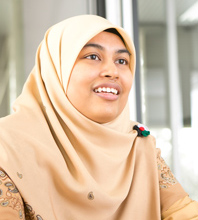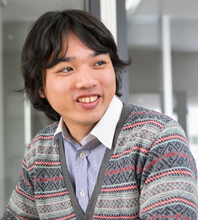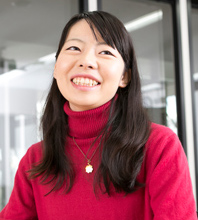Keio University’s Program for Leading Graduate Schools (3)
Going abroad for internships and research, and small-group guidance by mentors

Iza Husna, Binti Mohamad Hashim, Second-year master’s program student, Graduate School of Science and Technology
Binti Mohamad HashimDaisuke and Yuri sound so busy that it is about to make my head spin (laughs). At GESL, course credits of the program are also counted as course credits of the Graduate School of Science and Technology, so we are not that busy. However, international training is considered important, and we are required to participate in international internships and fieldwork for a total of three months during the master’s program and six months during the doctoral program. Last summer, I completed an internship at a research institute in Malaysia, my home country, analyzing environmental policy issues. Based on this experience, I am planning to go to Germany this year to study their system of purchasing electricity for popularizarizing renewable energy.

Daisuke Ando, First-year master’s program student, Graduate School of Business and Commerce
(Completed master’s program of the Graduate School of Science and Technology)

Yuri Yamamoto, First-year master’s program student, Graduate School of Medicine
(Completed master’s program of the Graduate School of Media and Governance)
Yuri:Also in our program, overseas training is quite a large component. During spring break, I went to Michigan and San Francisco, and Daisuke studied at UCLA.
Daisuke: In the first year, I also participated in an internship at a software development company in Silicone Valley. To prepare for this, I studied English quite intensively. During the first year of the program, we had English classes every Saturday.
Yuri:That’s right. At first, I had a hard time giving English presentations because I couldn’t make myself understood. Now I am not so afraid because my English and presentation skills have both improved.
Binti Mohamad Hashim: At GESL, we not only go into the field, but we can also use the remote conference system [remote collaboration system] to seek guidance from researchers and teachers of overseas universities and research institutes while in Japan. In addition to my supervisors for both my major and my minor, I also have one overseas, so I actually have three academic supervisors.
The remote conference system is used to connect the Yagami Campus and Shonan Fujisawa Campus (SFC) for classes of this program. Students of the Graduate School of Science and Technology and students of the Graduate School of Media and Governance each gather at their campus to attend the lectures. People at SFC tend to have unique ideas and it is really interesting.
Also, program members take turns organizing seminars. As for myself, when my former teacher in Malaysia came to Japan, I used this opportunity to organize a lecture on energy and the environment, which my teacher gave.. The seminars are open to the public, so those who aren’t program members can also attend the lectures.
Daisuke: I once attended a seminar that was held at Yagami Campus. It’s interesting because program members take turns in organizing and managing them.
One of the features of our program is guidance from mentors. A mentor looks after about three to four members, and every Saturday we receive guidance through group-work and case studies. Most mentors are active in the front lines of corporations, working in management positions. We study issues raised by the mentor based on their experience or actual social issues, or sometimes one of the members come up with a theme and we have discussions. All the mentors are really experienced, and not only can we learn about real methods for solutions, we get to benefit from their extensive connections.
Yuri:For example, when I said that I want to know more about health care service my mentor said, “Why don’t you come to my workplace to study?” and invited me to the office. My mentor pays a lot of attention to create a good learning environment for me, has broad connections, and introduces me to many people with different backgrounds. I think the connection with our mentors will become a great asset when we go out in the real world.
Daisuke:Although we talked about different things, in short, the appeal of this program is that we can broaden our horizons, which leads to viewing things from different angles, and that is so exciting to me.
Yuri:Since we extend to wider fields rather than sticking to a single research theme, we have time constraints, but it’s worthwhile if you are hungry to learn more. It is really exciting as you can see yourself grow.
Binti Mohamad Hashim:One of the great appeals of the program is that you have interaction with students from a different graduate school.If I hadn’t joined the program, I may have been stuck inside my lab. Taking the same classes with SFC students, now I understand their views that used to surprise me.
